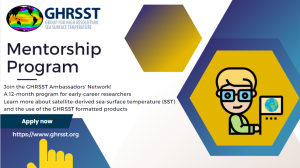 The Group for High Resolution Sea Surface Temperature (GHRSST) https://www.ghrsst.org/ offers a mentorship program to support early-career researchers interested in learning more about satellite-derived sea-surface temperature (SST), the use of the GHRSST formatted products but also scientific writing and publishing.
The Group for High Resolution Sea Surface Temperature (GHRSST) https://www.ghrsst.org/ offers a mentorship program to support early-career researchers interested in learning more about satellite-derived sea-surface temperature (SST), the use of the GHRSST formatted products but also scientific writing and publishing.
The program is for 6 months.
This is an unpaid, part-time (a few hours per month), remote-work educational opportunity.
Don’t miss your chance to become part of this international open scientific community!
Goals of the program
- Provide professional development for early-career researchers (mentees) researching and working with satellite-derived sea-surface temperature, using GHRSST formatted products, and scientific writing and publishing.
- Provide mentees with opportunities to explore personal interests in some aspect(s) of science and communicate their experiences to fellow early-career researchers and others.
- Create a network of early-career researchers working closely with the GHRSST international science team and acting as young ambassadors of the GHRSST community to foster the uptake of the GHRSST-specified products and data specifications.
Expectations and benefits
- Link to and collaborate directly with a member of the GHRSST international science team (who agrees to mentor you) to enhance your understanding/knowledge of satellite-derived sea-surface temperature, the use of the GHRSST formatted products and also scientific writing and scientific publishing.
- Participate in occasional virtual meetings with the GHRSST Science Team and the GHRSST Task Teams and other mentees to discuss tools and approaches to SST.
- Participate in the annual GHRSST meetings (e.g., international SST users and producers symposia combined with the GHRSST International Science Team meeting), the Task Team meetings, the GHRSST talks, and GHRSST trainings, gaining insight into the latest research in your field.
- Explore topics of special interest to you related to SST and gain knowledge of new topics outside your main lines of research.
- Preview and review some of the latest research in your field.
- Communicate your experience and results via social media posts, blogs, articles in the GHRSST social media and newsletter, and/or virtual events, in collaboration with the GHRSST Project Office (GPO).
- Act as an ambassador for GHRSST International Science Team, particularly to other early-career researchers.
- Possibility to become part of the Task Teams and/or the Science Team after completing the program.
Eligibility criteria
To apply:
- You must have completed a master.
- You must already have a background in SST and remote sensing (although may be limited) and skills in scientific writing/publishing.
- You are in any professional position related to remote sensing, earth observations, climate research and sea-surface temperature at the time of application.
How to apply?
Please submit the following application material via mail to the GHRSST GPO, to the attention of Chiara Bearzotti (Contact Us)
The application is based on a rolling admission: it means that the GHRSST Project Office will review applications as they’re sent in; there is no hard deadline by which you need to submit your application.
Please submit the following documents:
- A cover letter explaining why you are interested in this specific program within GHRSST and how the program will contribute to your professional development and career goals (1.000 words maximum).
- A CV, please include a list of your publications.
- A description of your areas of expertise (250 words maximum).
- The names and contact details of at least two referees who can support your application.
Applications will be reviewed by a selection committee comprising the GHRSST Science Team Chair and the members of the GHRSST Project Office. A short list of potential candidates will be interviewed via videoconference.
If you have any questions or would like additional information before applying, please contact the GHRSST GPO.
GHRSST is an open scientific community and values diversity.
We encourage all qualified candidates to apply for this Ambassador’s Network.
Your mentors for 2023/2024:
- Chongyuan Mao, UK Met Office (Member of the GHRSST science team)
- Haifeng Zhang, Bureau of Meteorology, Australia
- Ioanna Karagali, Danish Meteorological Institute (Member of the GHRSST science team)
[1] Category A Top grade researcher: the single highest grade/post at which research is normally conducted. Example: Full professor or Director of research. Category B Senior researcher: Researchers working in positions not as senior as top position but more senior than newly qualified doctoral graduates (IsCED level 8). Examples: associate professor or senior researcher or principal investigator. Category C Recognised researcher: the first grade/post into which a newly qualified doctoral graduate would normally be recruited. Examples: assistant professor, investigator or post-doctoral fellow. Category D First stage researcher: Either doctoral students at the IsCED level 8 who are engaged as researchers, or researchers working in posts that do not normally require a doctorate degree. Examples: PhD students or junior researchers (without a PhD).[/fusion_text][/fusion_builder_column][/fusion_builder_row][/fusion_builder_container]
